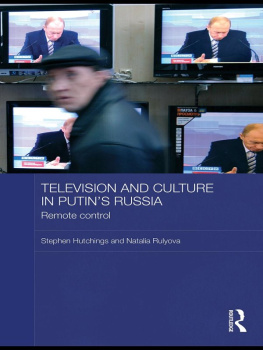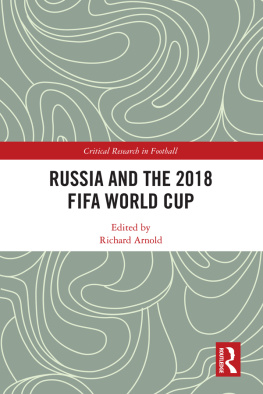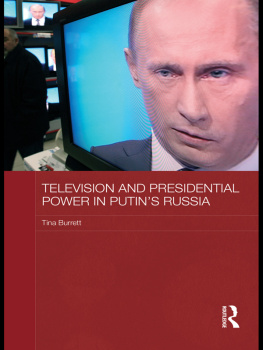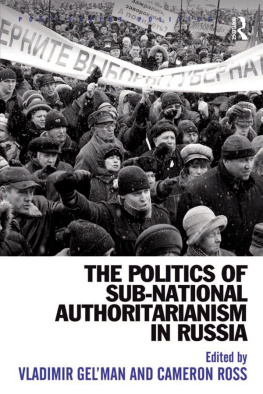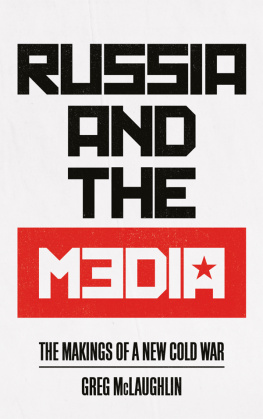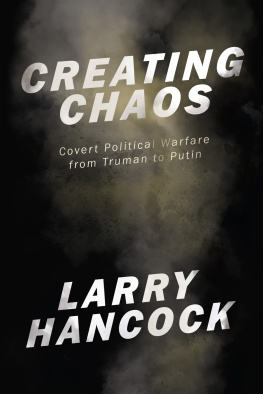Projecting Russia in a Mediatized World
This book presents a new perspective on how Russia projects itself to the world. Distancing itself from familiar, agency-driven International Relations accounts that focus on what the Kremlin is up to and why, it argues for the need to pay attention to deeper, trans-state processes over which the Kremlin exerts much less control. Especially important in this context is mediatization, defined as the process by which contemporary social and political practices adopt a media form and follow media-driven logics. In particular, the book emphasizes the logic of the feedback loop or recursion, showing how it drives multiple Russian performances of national belonging and nation projection in the digital era. It applies this theory to recent issues, events, and scandals that have played out in international arenas ranging from television, through theatre, film, and performance art, to warfare.
Stephen Hutchings is Professor of Russian Studies at the University of Manchester, UK.
BASEES/Routledge Series on Russian and East European Studies
Series editors:
Sociology and anthropology: Judith Pallot (President of BASEES and Chair), University of Oxford economics and business: Richard Connolly, University of Birmingham media and cultural studies: Birgit Beumers, University of Aberystwyth politics and international relations: Andrew Wilson, School of Slavonic and East European Studies, University College London history: Matt Rendle, University of Exeter
This series is published on behalf of BASEES (the British Association for Slavonic and East European Studies). The series comprises original, high-quality, research-level work by both new and established scholars on all aspects of Russian, Soviet, post-Soviet and East European Studies in humanities and social science subjects.
6Labour, Mobility and Informal Practices in Russia, Central Asia and Eastern Europe
Power, Institutions and Mobile Actors in Transnational Space
Edited by Rano Turaeva and Rustamjon Urinboyev
7Business Culture in Putins Russia
John Kennedy
8The Donbas Conflict in Ukraine
Elites, Protest, and Partition
Daria Platonova
9Siberian Exile and the Invention of Revolutionary Russia, 18251917
Exiles, migrs and the International Reception of Russian Radicalism
Ben Phillips
10Moscow and the Non-Russian Republics in the Soviet Union
Nomenklatura, Intelligentsia and Centre-Periphery Relations
Edited by Li Bennich-Bjrkman and Saulius Grybkauskas
11Conservatism and Memory Politics in Russia and Eastern Europe
Edited by Katalin Miklssy and Markku Kangaspuro
12Projecting Russia in a Mediatized World
Recursive Nationhood
Stephen Hutchings
For a full list of available titles please visit:www.routledge.com/BASEES-Routledge-Series-on-Russian-and-East-European-Studies/book-series/BASEES
First published 2022
by Routledge
2 Park Square, Milton Park, Abingdon, Oxon OX14 4RN
and by Routledge
605 Third Avenue, New York, NY 10158
Routledge is an imprint of the Taylor & Francis Group, an informa business
2022 Stephen Hutchings
The right of Stephen Hutchings to be identified as author of this work has been asserted in accordance with sections 77 and 78 of the Copyright, Designs and Patents Act 1988.
All rights reserved. No part of this book may be reprinted or reproduced or utilised in any form or by any electronic, mechanical, or other means, now known or hereafter invented, including photocopying and recording, or in any information storage or retrieval system, without permission in writing from the publishers.
Trademark notice: Product or corporate names may be trademarks or registered trademarks, and are used only for identification and explanation without intent to infringe.
British Library Cataloguing-in-Publication Data
A catalogue record for this book is available from the British Library
Library of Congress Cataloging-in-Publication Data
A catalog record for this book has been requested
ISBN: 978-0-367-26390-4 (hbk)
ISBN: 978-1-032-20122-1 (pbk)
ISBN: 978-0-429-29306-1 (ebk)
DOI: 10.4324/9780429293061
Typeset in Times New Roman
by Apex CoVantage, LLC
Acknowledgements
There is not the space here to acknowledge the support intellectual and moral of all the many people who contributed to discussions of the ideas and to the working environment that shaped this book. They include my excellent PhD students, along with endlessly patient, if sometimes baffled, family members forced to endure the sudden, dramatic changes of household routine associated with the correspondingly unpredictable bouts of scholarly productivity and inspiration which inevitably accompany writing projects on this scale and countless individuals who offered constructive criticism and vital encouragement at conferences where I presented my work.
More formal thanks are due to the Arts and Humanities Research Council without whose generous funding for two large research projects the book would not have been conceived, let alone written (AHRC reference numbers: AH/N004647/1 and AH/P00508X/1). I am also very grateful to the University of Manchester for granting me valuable sabbatical time (including an award under its competitive Enhanced Research Leave Scheme for Professors).
A very small portion of the material from the Introduction appeared earlier in a co-authored article published by Journalism in July 2020 (doi: can be found in Marille Wijermars and Katja Lehtisaari (eds), Freedom of Expression in Russias New Mediasphere (Abingdon, Routledge: 2020, Chapter 7). I am grateful to the publishers for permission to reuse this material.
As always, I must pay tribute to Peter Sowden, who commissioned my book for Routledge (it has become something of a habit!), and to the Routledge editorial staff who did such a thorough job in improving the manuscript and preparing it for publication.
I owe an enormous debt of gratitude to my good friend and colleague, Vera Tolz, who kindly waded through much of the books first draft and offered some highly astute and helpful suggestions from which later drafts benefitted significantly. The flaws, oversights, and errors that remain are, of course, down solely to me. I am grateful for the valuable comments made by other colleagues at the various forums in which I developed my thinking for the book. They include Catriona Kelly, Philip Bullock, Judith Pallot, Vlad Strukov, Marille Wijermars, Precious Chatterje-Doody, Rhys Crilley, Marie Gillespie, Vitaly Kazakov, Elizabeth Schimpfssl, Galina Miazhevich, Andy Byford, Connor Doak, Vitaly Kazakov, Ilya Yablokov, Lara Ryazanova-Clarke, Peter Rutland, and Julie Hemment.
I dedicate this book to my late father, Donald Hutchings, who passed away just before it was completed, after a long, exemplary life. Having first ignited my interest in Russian culture during my teenage years with a casual reference to one of his favourite Dostoevsky novels (lacking any formal education he was, nonetheless, an avid and perceptive consumer of the literary classics), he came to remark of my own more recent creations that they were becoming a little easier to follow. Sadly, he is no longer around to cast his stern eye over the current book, but he has always been, and will remain, my ideal reader.


